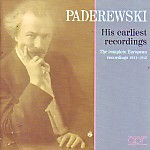Systematic treatment of Paderewski’s large discography is long overdue, and here we have his earliest recording sessions (1911-1912) complete, including seven previously unpublished sides, all presented in exceptionally clean, vivid new transfers by Seth Winner. Yes, the pianist’s technique was erratic and his rhythmic equilibrium not consistently stable, yet gorgeous moments invariably transpire.
For example, a Feburary 1912 Chopin F-sharp Nocturne from Paris features a brisk, wooden, and not very expressive middle section that gives no hint of the ravishingly drawn-out main theme recapitulation and coda to follow. A July 1911 Chopin A-flat Op. 34 No. 1 Waltz contains plenty of rough edges and slapdash jumps, but the trills are simply to die for. In fairness, Paderewski did better in his London remake a year later. The same goes for Liszt’s La Campanella, and the Chopin A minor Op. 17 No. 4 Mazurka, where Paderewski’s right-hand arabesques offhandedly yet magically float over the barlines.
However, I’m sure that he would have wanted to redo the Military Polonaise’s blotchier passages, although this July 1911 version easily surpasses the far sloppier Victor traversal from the late teens. The February 1912 Revolutionary Etude is a shade rougher than Paderewski’s better known electrical recording, yet steadier in pulse. For effortless legato and a strong sense of timing that not all of Paderewski’s recordings convey, go to the first and third pieces from Schumann’s Fantasiestücke. The Chopin/Liszt Maiden’s Wish and Liszt’s La Leggierezza find Paderewski in full control, at his most fluent, poetic, and communicative.
Producer Donald Manildi’s informative, fair-minded annotations discuss these recordings in the context of their time and Paderewski’s career. Whether or not this release signifies a future complete Paderewski edition from APR, it is bound to entice historic piano recording collectors.
































